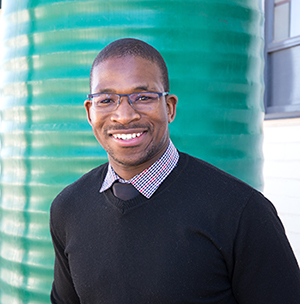Latest News Archive
Please select Category, Year, and then Month to display items
20 December 2021
|
Story Igno van Niekerk
|
Photo Igno van Niekerk
![]() Dr Samantha Potgieter, Senior Lecturer in the Department of Internal Medicine and Dr Nicholas Pearce, Senior Lecturer in the Department of Surgery comment on their team members’ commitment and determination during the pandemic.
Dr Samantha Potgieter, Senior Lecturer in the Department of Internal Medicine and Dr Nicholas Pearce, Senior Lecturer in the Department of Surgery comment on their team members’ commitment and determination during the pandemic.
On the forefront of the battle against the COVID-19 pandemic, two UFS doctors are leading a team of inspired healthcare workers in a superhuman effort to make a positive difference.
With the pandemic in its second year and the recurring challenges of new waves and strains consistently in the news, one would expect the doctors to be tired. However, quite the opposite is true. Upon entering the office where Dr Samantha Potgieter, Senior Lecturer in the Department of Internal Medicine and Dr Nicholas Pearce, Senior Lecturer in the Department of Surgery are in a meeting with colleagues, the debate is vibrant; an energetic sense of mission.
Miraculously succeeded
My brief is to collect stories and experiences they’ve had over the past 18 months at the Tumelo ward for general and high-care patients, where the team has miraculously succeeded in not running out of oxygen or ventilators, despite handling high volumes of patients from the Free State and Northern Cape. “We saw those pictures of piled-up bodies in Italy. We were committed to avoiding that at all costs. And we did.”
Success stories? First mentioned are their team members’ commitment and determination. The team had to stand in when families could not support dying patients. “They did not die alone. Our team was there.”
“Really sad and frustrating are the deaths that could have been prevented. Unvaccinated patients. They arrive ill, wanting to know if they can get it. Too late...” – Dr Nicholas Pearce
Then came hope
Sad stories? The past year has had its share of sad stories. “Someone comes in during the morning, needs oxygen, in the afternoon they are in ICU, then ventilator – and then they die. We’ve never faced anything like this before.”
Then came hope. Vaccines. Dr Pearce is in charge of the vaccination site at Universitas Hospital. “Really sad and frustrating are the deaths that could have been prevented. Unvaccinated patients. They arrive ill, wanting to know if they can get it. Too late ...” He opens his cell phone – shares the stats. “We can handle 2 000 vaccinations a day. At the moment about 250 comes in.” He shakes his head.
“We can beat this virus, but we need to stand together ...”
University of the Free State strives towards going ‘green’
2017-08-07

Benedict Mochesela from University Estates on the
UFS Bloemfontein Campus. A total of thirty brand-new
water storage tanks, between 5 000 and 20 000 litres,
were installed.
Photo: Anja Aucamp
Eight provinces, including the Free State, were declared disaster areas last year due to the ongoing drought. This had a devastating effect on the agricultural sector, leaving many communities dry.
University Estates at the University of the Free State found an ideal project to make university buildings greener. A total of thirty water storage tanks, varying in size from 5 000 to 20 000 litres, were installed at various buildings on the Bloemfontein Campus. As a pilot phase, these tanks were specifically installed at residences and buildings with high traffic volumes.
Importance of water tanks at the UFS
According to Benedict Mochesela, Project Manager of this initiative, the purpose of the project is to harvest rainwater, which will be used during emergencies when the campus does not have water and the emergency water storage facility is depleted. “This water is not intended for drinking, but for the flushing of toilets,” says Mochesela.
He mentioned that the water will also be used for watering flowerbeds and gardens when the water has been standing for a long time without being used.
Recycling water: An initiative to protect the environment
A number of water storage tanks are already in place at the Qwaqwa Campus and a preliminary phase of using grey water from residences is currently ongoing at the South Campus. Grey water is made up of bath, shower, and bathroom sink water. The water is reused for toilet flushing as well as for irrigation purposes.
“Recycling of water is one of a number of initiatives the university intends to undertake to ensure and show the community that this institution remains conscious of the environment and to changes which we continuously need to adapt to.”